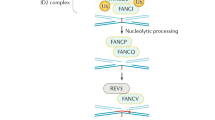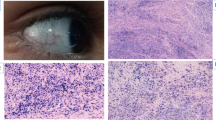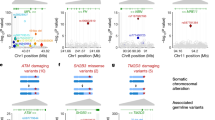Abstract
IN ataxia telangiectasia (AT), an autosomal recessive disease of man with neurological, cutaneous and immunological abnormalities1, cells from homozygotes are sensitive to ionising radiation2 and have a low capacity to repair the resulting DNA damage3. Heterozygotes lack the main clinical features of the syndrome but share with homozygotes a high predisposition to cancer4. One study has demonstrated an increased level of chromosomal abnormalities in some heterozygotes5. Because these heterozygotes represent ⩾1% of the population4 and cannot be diagnosed clinically, their characterisation represents a major challenge in cancer epidemiology. We report here the laboratory identification of a series of obligate heterozygotes for AT, based on the sensitivity of lymphoblastoid cell lines to ionising radiation.
This is a preview of subscription content, access via your institution
Access options
Subscribe to this journal
Receive 51 print issues and online access
$199.00 per year
only $3.90 per issue
Buy this article
- Purchase on Springer Link
- Instant access to full article PDF
Prices may be subject to local taxes which are calculated during checkout
Similar content being viewed by others
References
McFarlin, D. E., Strober, W. & Waldman, T. A. Medicine 51, 280–314 (1972).
Taylor, A. M. R. et al. Nature 258, 427–429 (1975).
Paterson, M. C., Smith, B. P., Lohman, P. H. M., Anderson, A. K. & Fishman, L. Nature 260, 444–447 (1976).
Swift, M., Sholman, L., Perry, M. & Chase, C. Cancer Res. 36, 209–215 (1976).
Oxford, J. M., Harnden, D. G., Parrington, J. M. & Delhanty, J. D. A. J. med. Genet. 12, 251–262 (1975).
Moss, D. J. & Pope, J. H. Int. J. Cancer 15, 503–511 (1973).
Moss, D. J. & Pope, J. H. J. gen. Virol. 17, 233–236 (1972).
Andrews, A. D., Robbins, J. H., Kraemer, K. H. & Buell, D. N. J. natn. Cancer Inst. 53, 691–693 (1974).
Patuleia, M. C. & Friend, C. Cancer Res. 27, 726–730 (1967).
Lavin, M. F. & Kidson, C. Nucleic Acids Res. 4, 4015–4022 (1977).
Lavin, M. F. & Kidson, C. Clin. Immun. Immunopath. (in the press).
Paterson, M. C., Smith, B. P., Knight, P. A. & Anderson, A. K. in Proc. Seventh int. Cong. Photobiol., Rome, 1–12 (1976).
Swift, M. Nature 230, 370–373 (1971).
Fujiwara, Y., Tatsumi, M. & Sasaki, M. S. J. molec. Biol. 113, 635–649 (1977).
Author information
Authors and Affiliations
Additional information
address for reprints (C.K.): Queensland Institute of Medical Research, Brisbane 4006, Australia.
Rights and permissions
About this article
Cite this article
CHEN, P., LAVIN, M., KIDSON, C. et al. Identification of ataxia telangiectasia heterozygotes, a cancer prone population. Nature 274, 484–486 (1978). https://doi.org/10.1038/274484a0
Received:
Accepted:
Issue Date:
DOI: https://doi.org/10.1038/274484a0
This article is cited by
-
ATM mutations improve radio-sensitivity in wild-type isocitrate dehydrogenase-associated high-grade glioma: retrospective analysis using next-generation sequencing data
Radiation Oncology (2020)
-
Defining COMMD4 as an anti-cancer therapeutic target and prognostic factor in non-small cell lung cancer
British Journal of Cancer (2020)
-
Variant Ataxia Telangiectasia: Clinical and Molecular Findings and Evaluation of Radiosensitive Phenotypes in a Patient and Relatives
NeuroMolecular Medicine (2013)
-
Low levels of ATM in breast cancer patients with clinical radiosensitivity
Genome Integrity (2010)
-
Ataxia-telangiectasia: from a rare disorder to a paradigm for cell signalling and cancer
Nature Reviews Molecular Cell Biology (2008)
Comments
By submitting a comment you agree to abide by our Terms and Community Guidelines. If you find something abusive or that does not comply with our terms or guidelines please flag it as inappropriate.



